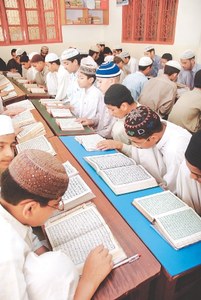In August last year, the then prime minister Imran Khan had launched the SNC at the primary level, saying the initiative will end disparity in society and provide equal opportunities to all students to excel. The Federal Education Ministry of current government PML(N) has decided to rename the Single National Curriculum (SNC) as National Curriculum of Pakistan (NCP). Federal Education Minster Rana Tanveer Hussain mentioned the reason for this change saying, ‘The word ‘single’ caused confusion and excluded the diversity of education’.
The government believes the enforcement of this national curriculum will bridge the widening gap between various systems of education in the country. The question is, will it be able to tackle the existing educational inequalities in Pakistan? In fact, it is more of a
leap backward than a step forward. Instead of improving standards in public-sector educational institutions and madrassahs in order to bring them at par with elite schools, the National curriculum or (SNC) does the opposite.
A major reason for prevailing inequality in the education system has been the deteriorating standard in our public-sector schools. The basic problem with our education system, as one leading expert points out, is that our books are ‘frozen in history’ and are regressive. There has not been any effort to change them. The new curriculum has reinforced the retrogressive content. So controversial are the new textbooks that the government found itself denying that even those related to science subjects had to be approved by the ulema board.
The move has made the NCP controversial even before its implementation. It is not the use of local languages as the medium of instruction in the elementary classes but it is the content of the prescribed textbooks that is problematic. In fact, the courses appear to reinforce a closed mindset and have nothing to do with the requirements of a modern education system. The implementation of the SNC will further downgrade the educational system. Increased focus on faith and narrow nationalism won’t produce an enlightened mind required to keep pace with the modern world. It can fuel bigotry that is not in short supply in society anyway.
According to some media reports, those reviewing the science textbooks objected to a picture of Sir Isaac Newton without a dupatta to cover what they perhaps took to be a woman’s long hair. A similar attitude was seen when the Punjab Curriculum and Textbook Board confiscated a book that included Malala Yousafzai among Pakistan’s heroes. Can the youngest Nobel Prize laureate whose work for girl education has been recognized internationally not be mentioned in our textbooks? And the less said the better about our history books.
The curriculum more or less fails to promote and include gender equality, religious minorities and cultural diversity. Women Action Forum released a statement, condemning the NCP as "based on ideological imperatives rather than pedagogical ones and will seed society with divisive thinking." The cover of the Grade 5 English textbook depicts a father and son studying on a sofa, while the mother and daughter study on the floor. Both the mother and daughter are also covering their heads with a hijab and most of the covers of the textbooks show even young girls donning the hijab. In the same textbook, women leaders are cited as "supporters of men." Girls and women are also mainly depicted as mothers, daughters, wives and teachers. They are not included in acts of play or exercise. Only boys are seen playing and exercising, while girls are included in images where they are mere bystanders.
These stereotypical depictions exist because no gender or intersectional lens has been utilized in the design of the books. Books that are meant to shape young minds and need to have a consistent theme and tone interwoven into the curriculum, the NCP is lacking that. If a gender lens was applied at the design, we would definitely have very different messages and learning. Due to the lack of an inclusive perspective, the NCP does not reflect the "rich diversity" of Pakistan, especially when it comes to the multiplicity of women's experiences.
While the national curriculum is in principle a good step towards unifying the younger generation, it is not enough as a strategy to bridge the existing inequalities within the education system of Pakistan. The government needs to invest more in the education sector and not rely only on a limited number of policies and strategies to overcome educational disparities. One cannot agree more that the educational apartheid must be eliminated and all citizens must have access to quality education. That can only be done by reforming our state education system. The problem cannot be resolved by a retrogressive curriculum.





